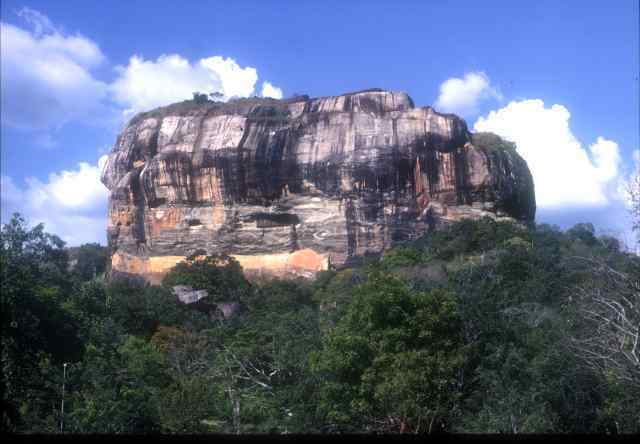This is Sigiriya, a large rock on an island nation that was once home to a local monarch who used slave labor to haul water to the top. That was all the information I had (along with a picture very similar this one) in the final round of the Vermont State Geography Bee in 1993. In fact I don't recall them even giving me the name of the rock; I just had to name the island nation.
The answer is Sri Lanka. I got it wrong. I can't remember what I actually said, although Indonesia seems most likely. I knew the rest of the questions asked in the competition, and the guy who won ended up on TV, in the top ten at the National Bee. On occasion, that crazy mountain still haunts me.
I've been reminiscing about my Geography Bee years since reading a chapter on it this morning from Ken Jennings' Maphead. The National Geography Bee was founded in 1988 by National Geographic Magazine as a response too poor geography knowledge among the nation's school children. Kids in 4th through 8th grade compete at the school level and the local winner takes a written test. The top 100 scores move on to the State Bee, which in turn sends its champion to Washington, DC, where the top ten competitors gets to play for a $25,000 scholarship on PBS in an event hosted by Alex Trebek.
The Gifted/Talented teacher at my elementary school let me participate in the school bee in 1990, as a third grader. The school was small, the bee was young; she probably wanted to make it seem more popular. I won. I remember the last question was "What is the only country in the world through which passes both the Equator and the Tropic of Capricorn. The other girl said Zaire, I picked Brazil. She still got to take the written test, as I was too young. I did manage to compete in the State Bee all five of me eligible years, but it was 6th grade that proved to be my best shot.
Jennings brings out what is the most surprising and important element of the Bee. It's not about memorizing capitals and rivers; the Bee does a fantastic job about testing a deeper, more thorough knowledge of geography. As evidenced by the Sri Lankan mountain above, most questions required an educated guess rather than a memorized fact. My knowledge of geography certainly isn't as sharp as it once was, even so, the 2009 Bee (that Jennings profiles) shows just how far the whole experience has come. The depth of knowledge required is insane. Every kid in DC would not only know what country that rock is in, but how tall it is, how many people visit it each year, and the middle name of the first white guy to see it.
One of my major flaws is that I tend to think I'm better at things than I really am. I'm good at trivial pursuit, but if I actually got on Jeopardy would I be able to blow everyone away? Probably not. I still believe I had a chance to win that Geography Bee had I just managed to come up with Sri Lanka, but I can in no way claim to have been as smart as the kids who win it these days.
I've often wondered if that outrageous sense of self-importance, one that tends to lack ego as much as it includes a basic ignorance of the world, is what breeds a nerd, dork, dweeb, geek or whatever you want to call us socially awkward intellectual types. Whether it's a type or just an subconscious attempt on my part to justify some seriously self-centered behavior, I've come to realize that this nerd quality, something I've used to positive define myself my entire life, might just be less important than actually helping and being present to other people.
Nothing ground breaking there. Lots of people realize as they mature that giving up selfish pursuits for the sake of meaningful relationships is a prerequisite for living in the world. Ir just feels good, now and then, to relive a little of that faded glory.

1 comment:
I've found that the best use of my 'curiosity about virtually everything' is to tame it and target my research into things that interest others as a way of building into them and getting to know them. Nerdiness that pursues it's own ends, in my opinion, is supremely self-interested. Nerdiness used in the service of others and for the purpose of making connections with and building up others, may be less so...at least, I hope it is :).
Post a Comment